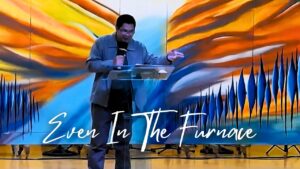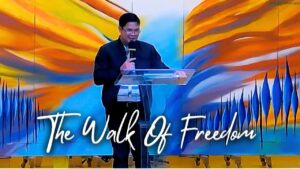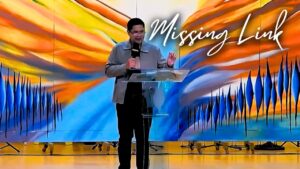BREAD IN THE WILDERNESS
Exodus 16: 1- 5
The whole Israelite community set out from Elim and came to the Desert of Sin, which is between Elim and Sinai, on the fifteenth day of the second month after they had come out of Egypt. 2 In the desert the whole community grumbled against Moses and Aaron. 3 The Israelites said to them, “If only we had died by the Lord’s hand in Egypt! There we sat around pots of meat and ate all the food we wanted, but you have brought us out into this desert to starve this entire assembly to death.”
4 Then the Lord said to Moses, “I will rain down bread from heaven for you. The people are to go out each day and gather enough for that day. In this way I will test them and see whether they will follow my instructions. 5 On the sixth day they are to prepare what they bring in, and that is to be twice as much as they gather on the other days.”
A seven-year famine was responsible for God’s chosen people ending up in Egypt. Initially, they flourished under the leadership of Joseph, number two in charge of the country after Pharaoh. “Then a new king, who did not know about Joseph, came to power in Egypt” (Exodus 1:8), and soon, “the Egyptians came to dread the Israelites” (Exodus 1:12). For the next several centuries the Israelites were enslaved by the Egyptians who “worked them ruthlessly” (Exodus 1:13).
The provisions of Israel, brought from Egypt, were spent by the middle of the second month, and they grumbled.
They undervalued their deliverance, that they wished they had died in Egypt; and by the hand of the Lord, by the plagues which cut off the Egyptians.
When God plagued the Egyptians, it was to make them know He was their Lord; when he provided for the Israelites, it was to make them know He was their God.
Title: BREAD IN THE WILDERNESS
- Grumbling
- The Degree of Grumbling
- God’s Gracious Provision
- The Bread from Heaven
What is Wilderness?
Oxford English Dictionary = wild or uncultivated land.
Spiritually, the wilderness is a place for intense experiences—of stark need for food and water, of renewal, of encounters with God. There is a psychology as well as a geography of wilderness, a theology gained in the wilderness.
In the New Testament, which was written in Greek, “wilderness” is eremos (or eremia), an isolated place. A place of obscurity, irrelevance, disadvantage, a place of undervalue. A situation where you feel you are destitute or deprived.
God will never lead us where His grace cannot provide for us or His power cannot rescue us. The Israelites had seen the powerful hand of God at work during the plagues and miracles of the Exodus. Yet in the wilderness they GRUMBLED.
( I. ) GRUMBLING.
The Difference between Complaining and Grumbling:
Complaining:
In Joel 1, amidst all the pain and sorrow, we see that he knows that God is still there and can be called upon. Joel is complaining but he is not grumbling. He knows the source of His help and his hope.
When we complain, it is frequently evil. But complaining is not necessarily evil.
Faithless complaining is sinful because it accuses God of doing wrong. But faithful complaining is an honest, groaning expression of what it is like to experience the trouble, anguish, and grief of living in this fallen, futile world (Romans 8:20–23).God does not mind this kind of complaining.
With my voice I cry out to the Lord; with my voice I plead for mercy to the Lord. I pour out my complaint before him; I tell my trouble before him. (Psalm 142:1–2)
How God Wants Us to Complain?
Most of the biblical and righteous complaints are contained in what we call the psalms of lament. The Book of Psalms contains the prayers and hymns that God chose to teach us how to express ourselves to him in worship.
The writers pour out to God their sorrow (Psalm 137), anger (Psalm 140), fear (Psalm 69), longing (Psalm 85), confusion (Psalm 102), desolation (Psalm 22), repentance (Psalm 51), disappointment (Psalm 74), and depression (Psalm 88), either because of external evil or internal evil or darkness.
He knows that we frequently will experience bewildering pain and therefore will frequently need to express our pain to him. God wants us to pour out our complaints to him and tell him our troubles (Psalm 142:2).
Grumbling.
Grumbling is what the Israelites did in the desert. They were starving, thirsty and mad that God had dragged them out into the desert to die. Their eyes were focused solely on their surroundings and their circumstances. They thought only of themselves. They thought nothing of God.
Grumbling is more to yourself.
The Bible often refers to faithless complaining as grumbling and warns us not to do that.
“Stop grumbling among yourselves, ”John 6: 43
“Do not grumble against one another, brothers, so that you may not be judged; behold, the Judge is standing at the door “James 5:9
Complaining involves a spirit of submission. Grumbling is tainted with pride and self-centeredness.
( II. ) THE DEGREE OF GRUMBLING.
Grumbling directly or indirectly:
- Questions God’s Sufficiency
In Exodus 9:1–7, the Bible tells us that the children of Israel had cattle or livestock while living as slaves in Egypt. And in Exodus 12:30–31, Pharaoh tells Moses to get out of Egypt after the final plague had been placed on Egypt and all their firstborn sons had died. Pharaoh even went so far as to tell the Israelites to take all that they had, including their flocks and their herds, possibly getting every trace of them out of Egypt.
Why did they describe themselves as “starving” when they had flocks and herds of animals?
Possible reasons:
First, it’s possible that Israel had too much of the Egyptian ways in them, having been in captivity there for over 400 years. It’s possible they were so steeped in Egyptian ways that they couldn’t bring themselves to eat animals they worshiped.
Second possibility is that they were just whining because they were tired of eating the same old thing all the time.
Thirdly, they see their livestock as their source of income. No one would want to eat his source of income. Perhaps they were preserving their flocks and herds for when they came into the Promised Land and would once again be shepherds and herdsmen.
They kept for themselves what were supposed to be God-given resources and still expecting God to provide for their needs. The resources were in their hands but they chose to grumble like abandoned people.
We do not realize that the resources are already in our hands, at our disposal.
God asked Moses, “what is in your hand?”
We should not be looking for somebody else to do the ministries that we can do in the church. Each of us has been given gifts and talents and is part of the body of Christ.
If you have the capacity to give, give with an open heart. Let us not expect someone else to do what we can do.
E.g. The story, titled “Whose Job Is It, Anyway?”
May we not look from somewhere else of anything that is already in our hands.
Whatever the reason the people of Israel had, the point is that it wasn’t meat that they lacked; it was TRUST in God’s sufficiency.
Nothing would please or satisfy grumbling people, not meat for a whole month, not all the flocks and herds or all the fish in the sea.
- Questions God’s Sovereignty.
Exodus. 13:17-18When Pharaoh let the people go, God did not lead them by way of the land of the Philistines, although that was near. For God said, “Lest the people change their minds when they see war and return to Egypt.” But God led the people around by the way of the wilderness toward the Red Sea. And the people of Israel went up out of the land of Egypt equipped for battle.
Exodus 16: 3 The Israelites said to them, “If only we had died by the Lord’s hand in Egypt! There we sat around pots of meat and ate all the food we wanted, but you have brought us out into this desert to starve this entire assembly to death.”
They craved not just for food but for “control” over their lives. They felt insignificant, deprived and undervalued because they were brought to the wilderness. They doubted the acts of God. They have no trust in His sovereignty.
What is God’s sovereignty?
- God is in control of our circumstances, even when we don’t understand what He is doing. The secret things belong to the LORD our God, but the things that are revealed belong to us and to our children forever, that we may do all the words of this law ( 29:29).
Matthew 5: 4 (Message Bible)“You’re blessed when you feel you’ve lost what is most dear to you. Only then can you be embraced by the One most dear to you.”
- God is calling us to surrender to his control by holding our plans loosely. The heart of man plans his way, but the Lord establishes his steps ( 16:9).
When you close your hand too tight, you cannot receive what God will pour over it. But with open palms we can receive and can let go. God gives and takes away.
(III.) GOD’S GRACIOUS PROVISION.
Despite the fact that the people were so distrusting, God was gracious and merciful.
God, in His sufficiency and sovereignty miraculously provided the Israelites with “manna.” And Moses said to them, ‘It is the bread that the LORD has given you to eat’” (Exodus 16:15).
Psalm 78:24 refers to manna as “grain from heaven,” and it is also called “bread of angels.” But the miracle of manna ceased shortly after the Israelites entered the Promised Land (Joshua 5:12).
God does not fail to provide when there is a need. “He causes his sun to rise on the evil and the good, and sends rain on the righteous and the unrighteous.” (Matthew 5: 45b)
( IV. ) THE BREAD FROM HEAVEN
Just as God provided manna to the Israelites to save them from starvation, He has provided Jesus Christ for the salvation of our souls. The literal manna temporarily saved the Israelites from physical death. The spiritual manna saves us from eternal death. Jesus said, “Your fathers ate the manna in the wilderness, and they died. This is the bread that comes down from heaven, so that one may eat of it and not die” (John 6:49-50). “Truly, truly, I say to you, it was not Moses who gave you the bread from heaven, but my Father gives you the true bread from heaven. For the bread of God is He who comes down from heaven and gives life to the world. . . . I am the bread of life; whoever comes to me shall not hunger, and whoever believes in me shall never thirst”(John 6:32-35).
As the manna of the Exodus sustained and strengthened the Israelites for the forty years of desert wanderings, so Jesus strengthens and sustains us spiritually as we walk through this life on our way to heaven. Jesus is the “manna” from heaven—the spiritual sustenance we need—and it is promised to us.
The manna is “hidden” in that it is given exclusively to believers in Christ.
And the recipient of the hidden manna is in Revelation 2:17 as “the one who is victorious.”
The overcomer is one who endures in his faith, despite trials and hardships. Overcomers are followers of Christ who successfully resist the power and temptation of this world. An overcomer holds fast to faith in Christ until the end. He demonstrates complete dependence upon the Lord Jesus through thick and thin. I John 5:4–5 encourages us that all who are born again will overcome this world: “For whatever is born of God overcomes the world; and this is the victory that has overcome the world—our faith. Who is the one who overcomes the world, but he who believes that Jesus is the Son of God?”
The children of Israel grumbled because they had difficulty in trusting God. They had TRUST ISSUE. They did not believe that the God who called them out of bondage is all sufficient and able to keep His promise and they did not trust what God was doing when they were in obscurity.
Man has TRUST ISSUE since the beginning. Even if he experiences miracles upon miracles, he can still fail if what he sees is only himself and not God.
But whatever the Israelites or the fallen man failed to do, Jesus perfected. He came to correct this TRUST ISSUE.
He proved the sufficiency of God by His life and ministry.
– He proved the life-giving sufficiency of God by raising the dead He encountered.
– He proved the health-giving sufficiency of God by healing the sick, the blind, the lame, paralytic and the dumb.
– He proved the ever-caring God by feeding the hungry.
– He proved the freedom- giving God by setting the demon possessed free.
He also came to show God’s sovereignty.
In Gethsemane He said, “Not my will but Yours be done”
He knew He had to suffer and die but He trusted that God knew what He was doing. He entrusted everything into the all-powerful hand of the sovereign God.
And to further assure us of God’s sufficiency and sovereignty, when He suffered on the cross he went through the wilderness of “no-answer” when He called, “no -help” when He cried and “no-provisions” when He needed.
Jesus on the cross is God’s provision, the “Bread from heaven” the Greater manna, whose body was broken.
He said, “I Am the Bread of Life.” He is the giver of life and purpose.
Jesus rose from the dead and is seated on the throne. He is now God’s sufficiency for us and He is the proof of God’s sovereignty over our lives.
He said, “All power is given to me in heaven and on earth…”
In Christ we can ask anything according to His will and He will give it to us and nothing will happen to us by chance because the steps of a righteous man is ordered by God. Righteous because of what Jesus did.
CONCLUSION:
In our life as a Christian, many times we find ourselves trapped in the wilderness. Either we fall into it because of sin or mistakes, or some people made us go through it. And there, we don’t only experience scarcity but humiliation, insignificance, hurts and even shame.
Instead of grumbling like what the people of Israel do, complain it to God. Bring a trustful and faithful complain to the Lord. He was there in our wilderness, too. “For we do not have a high priest who is unable to empathize with our weaknesses, but we have one who has been tempted in every way, just as we are—yet he did not sin. Let us then approach God’s throne of grace with confidence, so that we may receive mercy and find grace to help us in our time of need.” Hebrews 4:15-16





